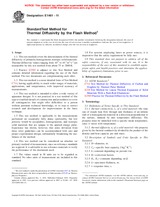Wir benötigen Ihre Einwilligung zur Verwendung der einzelnen Daten, damit Sie unter anderem Informationen zu Ihren Interessen einsehen können. Klicken Sie auf "OK", um Ihre Zustimmung zu erteilen.
ASTM E1461-11
Standard Test Method for Thermal Diffusivity by the Flash Method
Automatische name übersetzung:
Standard -Testverfahren für die Temperaturleitfähigkeit vom Flash Method
NORM herausgegeben am 1.12.2011
Informationen über die Norm:
Bezeichnung normen: ASTM E1461-11
Anmerkung: UNGÜLTIG
Ausgabedatum normen: 1.12.2011
SKU: NS-41835
Zahl der Seiten: 11
Gewicht ca.: 33 g (0.07 Pfund)
Land: Amerikanische technische Norm
Kategorie: Technische Normen ASTM
Die Annotation des Normtextes ASTM E1461-11 :
Keywords:
flash method, infrared detectors, intrinsic thermocouples, specific heat capacity, thermal conductivity, thermal diffusivity, transient temperature measurements, Carbon, Flash/no flash method, Graphite, Infrared (IR) analysis, Intrinsic thermocouples, Laser flash method, POCO graphite, Solid phase materials, Thermal conductance/conductivity, Thermal diffusivity, Transient temperature measurements, ICS Number Code 17.200.10 (Heat. Calorimetry)
Ergänzende Informationen
| Significance and Use | ||||||
|
Thermal diffusivity is an important property, required for such purposes under transient heat flow conditions, such as design applications, determination of safe operating temperature, process control, and quality assurance. The flash method is used to measure values of thermal diffusivity, α, of a wide range of solid materials. It is particularly advantageous because of simple specimen geometry, small specimen size requirements, rapidity of measurement and ease of handling.. Under certain strict conditions, specific heat capacity of a homogeneous isotropic opaque solid specimen can be determined when the method is used in a quantitative fashion (see Appendix X2). Thermal diffusivity results, together with related values of specific heat capacity (Cp) and density (ρ) values, can be used in many cases to derive thermal conductivity (λ), according to the relationship: |
||||||
| 1. Scope | ||||||
|
1.1 This test method covers the determination of the thermal diffusivity of primarily homogeneous isotropic solid materials. Thermal diffusivity values ranging from 10-7 to 10-3 m2·s-1 are measurable by this test method from about 75 to 2800 K. 1.2 Practice E2585 is adjunct to this Test Method and contains detailed information regarding the use of the flash method. The two documents are complementing each other. 1.3 This test method is a more detailed form of Test Method C714, having applicability to much wider ranges of materials, applications, and temperatures, with improved accuracy of measurements. 1.4 This test method is intended to allow a wide variety of apparatus designs. It is not practical in a test method of this type to establish details of construction and procedures to cover all contingencies that might offer difficulties to a person without pertinent technical knowledge, or to stop or restrict research and development for improvements in the basic technique. 1.5 This test method is applicable to the measurements performed on essentially fully dense (preferably, but low porosity would be acceptable), homogeneeous, and isotropic solid materials that are opaque to the applied energy pulse. Experience has shown, however, that some deviation from these strict guidelines can be accommodated with care and proper experimental design, substantially broadening the usefulness of the method. 1.6 This test method can be considered an absolute (or primary) method of measurement, since no reference standards are required. It is advisable to use reference materials to verify the performance of the instrument used. 1.7 The values stated in SI units are to be regarded as standard. No other units of measurement are included in this standard. 1.8 For systems employing lasers as power sources, it is imperative that the safety requirement be fully met. 1.9 This standard does not purport to address all of the safety concerns, if any, associated with its use. It is the responsibility of the user of this standard to establish appropriate safety and health practices and determine the applicability of regulatory limitations prior to use. |
||||||
| 2. Referenced Documents | ||||||
|
Empfehlungen:
Aktualisierung der technischen Normen
Wollen Sie sich sicher sein, dass Sie nur die gültigen technischen Normen verwenden?
Wir bieten Ihnen eine Lösung, die Ihnen eine Monatsübersicht über die Aktualität der von Ihnen angewandten Normen sicher stellt.
Brauchen Sie mehr Informationen? Sehen Sie sich diese Seite an.




 Cookies
Cookies
